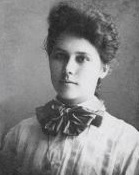Most of us know the names associated with Tabor's early history, including the Todd, Adams and Gaston families. Among the less well known was the Rodman family, typical of many families who settled in the local area--pioneers in every sense.
Born in Fayette County Kentucky in 1799, William Hallam Rodman Sr. emigrated with his family in the 1830s to Henderson County, Illinois, near the border with the Territory of Iowa. Always looking west like so many others, Rodman's eldest son, William Rodman Jr., struck off and crossed into Iowa in 1854. He found what he was looking for in Lyons Township, Mills County, where he claimed arable land under the provisions of the Land Act of 1820, a law that encouraged westward migration by giving farmers the chance to acquire property through time purchase at $1.25 an acre. In 1858, the 24-year-old William Rodman Jr. took legal title of 120 acres, about three miles northwest of Tabor in the Loess Hills, married a local girl, Nancy Withrow, a few months later and started a family. The home place eventually passed to his only son, Isaac Franklin Rodman.
 Grace Alice Rodman was born in 1886, the middle child of Isaac, known as Frank, and his wife Mary Alwilda (nee Buckingham). Grace's parents provided a solid foundation of hard work, faith, and education for their children, which included attendance at the nearby Walnut Grove School, in Lyons Township and membership in Tabor's Methodist Episcopal Church. Grace also attended Tabor High School, graduating in 1904. It was a singular accomplishment, considering the national high school graduation rate of six percent. The excitement and pride of the class was evident in their motto: "Give us the earth, give us the floor, we are the class of 1904."
Grace Alice Rodman was born in 1886, the middle child of Isaac, known as Frank, and his wife Mary Alwilda (nee Buckingham). Grace's parents provided a solid foundation of hard work, faith, and education for their children, which included attendance at the nearby Walnut Grove School, in Lyons Township and membership in Tabor's Methodist Episcopal Church. Grace also attended Tabor High School, graduating in 1904. It was a singular accomplishment, considering the national high school graduation rate of six percent. The excitement and pride of the class was evident in their motto: "Give us the earth, give us the floor, we are the class of 1904."
After earning her diploma, Grace followed the path of many young unmarried women of the era by becoming a teacher. At that time, the teaching profession was managed on the county level, adhering to regulations laid down by the State of Iowa. William Moore, the Mills County Superintendent, could offer an 18-year-old high school graduate a one year teaching certificate after the candidate successfully passed an examination covering knowledge of "orthography (spelling), reading, writing, arithmetic, geography, grammar, history of the United States, didactics (teaching skills), physiology and hygiene." Grace would have also been required to provide evidence of a "good moral character." The last step required attendance at an annual week-long Normal Institute training session, held in Malvern the last week of June, 1905. Grace was posted to the one-room school located at Pleasant Hill, in Rawles Township. Notably, teaching was overwhelmingly dominated by women. For the 1905-6 school year Mills County employed 132 teachers of which 113 were women. Grace later transferred to Walnut Grove, the school she once attended as a young girl.
Grace Rodman's life as a rural school teacher was certainly a one-woman enterprise and not for the faint hearted. She was first in and last out, not only teaching but caring for the school, laying in supplies (normally provided by families of the students at cost), stoking the fire in winter, and cleaning. No doubt she helped with chores at home as well so her days were long. Records are fragmentary, but Grace is listed on Mills County school accounts as earning an average salary for Iowa teachers at that time, around $30.00 per month. Rural schools were isolated, serving farm children in the immediate area, but they also formed part of a larger community. On May 24th, 1906, 60 students from six local schools took part in a quiz program at the Waubonsie Church, crowded to overflowing with parents and neighbors. Grace's class won the prize for attendance, and participating schools were presented with "a nice large wall map of Iowa. Something very much needed in every school."
Grace Rodman's teaching days ended when in 1910 she married Harry Hurlbutt Wilkins, the eldest son of neighbors Alfred and Eunice Wilkins. After a honeymoon in Chicago, the young couple settled into their own home on his parent's farm, about a mile north of Tabor, but not before removing a buggy that had been placed as a prank on the roof. As reported in the Tabor Beacon, "it was certainly a conspicuous object."
Grace and Harry's 39-year marriage was grounded on their two sons, Harold and Franklyn, their farm, christened "Sunny Home Farm" by Harry's mother, and the community of Tabor. They were members of the Congregational Church, owned and operated a machine parts business in Tabor in the 1930s and belonged to several social, service and business clubs. After her husband's passing in 1950, Grace lived quietly in Tabor until her death in 1986 at the age of 100. At the time, she was Tabor's oldest resident.
Notes: Grace Rodman Wilkins (1886-1986) was my paternal grandmother. Letters and photographs referenced in this article are contained in the private collection of her papers and personal effects. Supplementary information was found in Mills County newspapers from 1905-06, including the Malvern Leader. Harry Wilkins, Tabor, Iowa.
Source: Written by Harry Wilkins, used with permission.